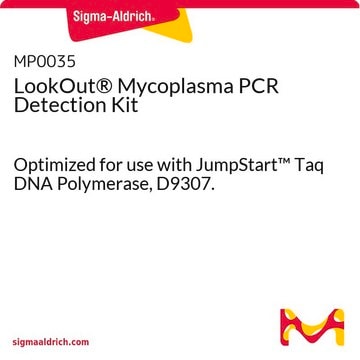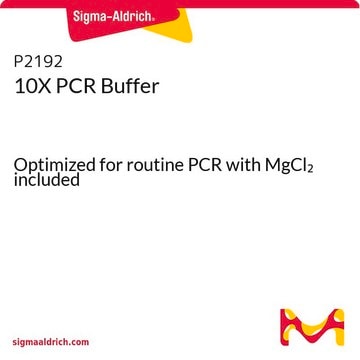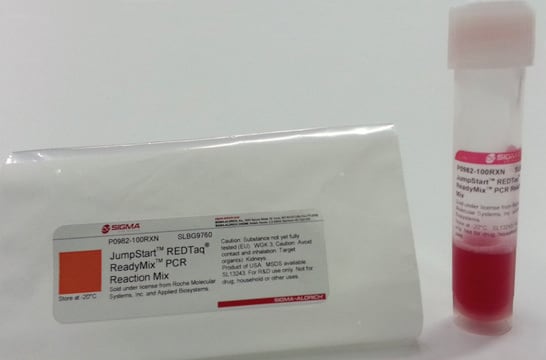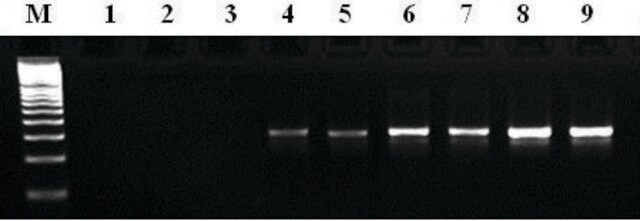D9307
JumpStart™ Taq DNA Polymerase
with MgCl2
Synonym(s):
hot start DNA polymerase, hot start PCR
About This Item
Recommended Products
form
liquid
usage
sufficient for 1500 reactions
sufficient for 250 reactions
sufficient for 50 reactions
feature
dNTPs included: no
hotstart
concentration
2.5 units/μL
technique(s)
PCR: suitable
color
colorless
input
purified DNA
suitability
suitable for PCR
application(s)
agriculture
shipped in
wet ice
storage temp.
−20°C
Looking for similar products? Visit Product Comparison Guide
Related Categories
General description
Application
- in the amplification of DNA libraries of varying sizes
- in a methylation-specific, quantitative real-time polymerase chain reaction (MS-qPCR) to determine the BRCA1 promoter methylation status
- in the generation of plasmid by amplifying the full-length of HIF1β via PCR
- For PCR amplifications that require reduced non-specific amplification
- For multiplex PCR
- For reduction of primer dimers
Features and Benefits
- Reduces non-specific amplification
- Increases PCR specificity and yield
- Reduces set-up time concerns associated with manual or wax Hot Start methods
- Activation time of less than 1 minute
Packaging
Other Notes
Unit Definition
Legal Information
Antibody licensed for in vitro research use under U.S. Patent No. 5,338,671 and 5,587,287, and corresponding patents in other countries.
related product
Storage Class Code
10 - Combustible liquids
Flash Point(F)
Not applicable
Flash Point(C)
Not applicable
Regulatory Listings
Regulatory Listings are mainly provided for chemical products. Only limited information can be provided here for non-chemical products. No entry means none of the components are listed. It is the user’s obligation to ensure the safe and legal use of the product.
PDSCL
Please refer to KIT Component information
PRTR
Please refer to KIT Component information
FSL
Please refer to KIT Component information
ISHL Indicated Name
Please refer to KIT Component information
ISHL Notified Names
Please refer to KIT Component information
Cartagena Act
Please refer to KIT Component information
JAN Code
キットコンポーネントの情報を参照してください
Certificates of Analysis (COA)
Search for Certificates of Analysis (COA) by entering the products Lot/Batch Number. Lot and Batch Numbers can be found on a product’s label following the words ‘Lot’ or ‘Batch’.
Already Own This Product?
Find documentation for the products that you have recently purchased in the Document Library.
Customers Also Viewed
Articles
Explore PCR's history, from discovery to Nobel Prize. Discover real-time PCR (qPCR) and digital PCR developments.
Protocols
Whole Genome Amplification products, including kits for DNA extraction, support various DNA sources.
GenomePlex® Whole Genome Amplification efficiently extracts DNA from animal samples for genomic analysis.
Mycoplasma contamination of cell cultures is a serious issue impacting cell model validity. PCR testing for mycoplasma is an inexpensive, sensitive, and specific method for detecting contamination.
Protocol extracts genomic DNA from blood cards, useful for limited DNA samples in amplification.
Our team of scientists has experience in all areas of research including Life Science, Material Science, Chemical Synthesis, Chromatography, Analytical and many others.
Contact Technical Service














